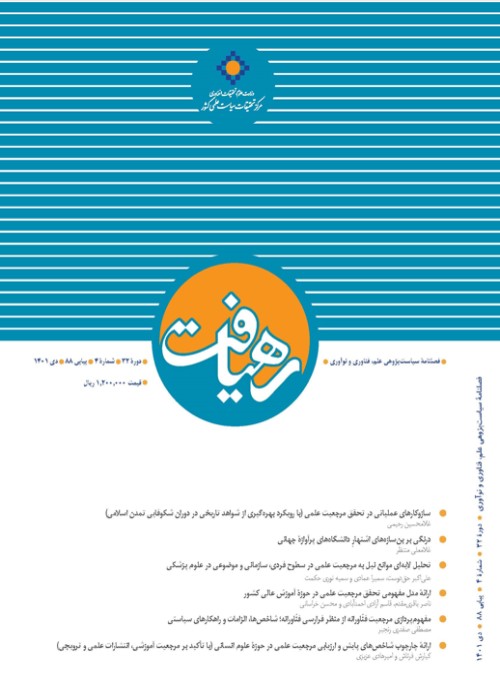Presenting a framework of indicators for monitoring and evaluating scientific authority in humanities (With an emphasis on educational, scientific publication, and promotion authority)
Scientific authority is one of the keywords that are frequently used in upstream documents and macro policies of science, technology and innovation of the country, but usually appropriate evaluation indicators of its measurement are not transparently presented. Approval of the executive regulation of Iran's science, technology and innovation monitoring system in the Supreme Council of Science, Research and Technology (CSRT) in 2017 is a turning point in Iran's science, technology and innovation system. However, due to the soft nature and complexity of the fundamentals of the Humanities, monitoring and evaluation of science, technology and innovation in this field has been accompanied by difficulties. Therefore, setting a framework for the indicators of scientific authority evaluation in the Humanities is more important than ever before. From the perspective of the purpose, this paper seeks to provide an appropriate framework for monitoring and evaluation indicators of educational, scientific and developmental authority of the Humanities using upstream documents and related international experiences. In reviewing the background of the research, this section includes two subdivisions including the International Monitoring and Evaluation of Science, Technology and Innovation Experiences in the Field of Humanities (in which the experience of the American Academy of Arts and Sciences, International Social Science Council, European Commission, British Academy and the Royal Netherlands Academy of Arts and Sciences have been studied in the field of Humanities monitoring), as well as analysis of upstream documents related to the research (General Policies of Science and Technology Announcement of the Supreme Leader, Science and Technology Roadmap, Document of the fundamental transformation of education and also Document of the Islamic University) that the results extracted in accordance with the executive regulations of the system of monitoring and evaluation of science, Iran's technology and innovation has been examined. The research method in this paper is applied in terms of type, its basic strategy is qualitative and descriptive. For this purpose, both primary data (policy documents, reports, and international dashboards) extracted from study sources and secondary data (holding 8 expert panel meetings and structured interviews with 5 selected members of panels) have been exploited. In order to examine the findings, indicators derived from the analysis of relevant international experiences and policy documents (background review) following the executive regulations of Iran's science, technology and innovation monitoring system which includes eleven criteria have been investigated. According to the specific topic of this article, which is the explanation of the indicators of monitoring and evaluation of educational, scientific and extension authority of the Humanities, four categories of the mentioned regulations including a. general and professional education, b. higher education, c. scientific publications and d. promoting science, technology and innovation are considered. In the final section, the final framework of the indicators of educational, scientific and extension authority in the field of Humanities is summarized in the following four categories: General and professional education of Humanities (including quantity and quality of general and professional Humanities education); Higher education in the Humanities (including the quantity and quality of higher education in Humanities); Scientific publications of Humanities (including publication of books, quantity and quality of research, and quantity and quality of scientific articles in the field of Humanities); Promoting science, technology and innovation in the field of Humanities (including publications (magazines, and public books), events (specialized exhibitions, conferences, etc.), cyberspace (including databases, social networks, etc.) in the field of Humanities and promotion centers); The novelty of this paper's compared to the previous studies is considering Iran's peculiarities in monitoring and evaluating humanities toward attaining scientific authority. We also note that achieving the desired results in evaluation and monitoring of the status of scientific, educational and extension authority of the Humanities depend on cooperation and unity of procedural practices of the trustee organizations and institutions. It is expected that responsible entities, while executing their responsibilities, collaborate in collecting and analyzing relevant data to minort and assess scientific authority of humanities.
- حق عضویت دریافتی صرف حمایت از نشریات عضو و نگهداری، تکمیل و توسعه مگیران میشود.
- پرداخت حق اشتراک و دانلود مقالات اجازه بازنشر آن در سایر رسانههای چاپی و دیجیتال را به کاربر نمیدهد.



